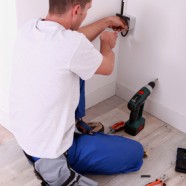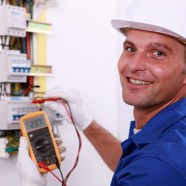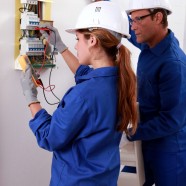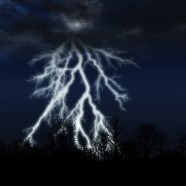4 Signs You Need a Commercial Electrical Technician
Most business people try to avoid calling in service people for as long as possible to avoid that hit on the bottom line. For some parts of your business, such as landscaping or décor, this makes perfect sense. When it comes to electrical problems, though, putting off repairs can endanger your customers and employees as well as cause significant risk of fire. Not every glitch in your circuit breaker is reason to call a commercial electrical provider, but if you’re having significant issues with these clues, it’s time to call a pro. You’ll save money in the long run, because equipment in good shape lasts longer, plus you’ll have peace of mind knowing your business is safe from electrical fires.
#1: Lightning Protection
Businesses in Florida are especially vulnerable to fires from lightning strikes, as this is the lightning capitol of the country. If your business is lacking lightning protection technology, your first priority should be to call and have a system installed. If you’re thinking of unattractive tall lightning rods of the past, don’t worry about it. Today’s lightning protection comes in the form of air terminals, short poles usually measuring about 12 inches high, that unobtrusively blend in with your roof line. A commercial electrical professional can plan the right system of air terminals for your building’s height and square footage, and will install the system so that it won’t detract from the looks of your building. Once you have a lightning protection system in place, call your commercial insurance agent. Most companies give a discount on their premiums when lightning safety systems are installed.
#2: Electrical Outlets
Electrical outlets are so common that it’s easy to think they’ll last forever. Like any other piece of equipment in your building, though, they wear out and break down eventually. Some signs of outlet wear are simple indications that they need to be updated to accommodate more modern usage. Some other signs are clues that there is actually electrical problems in your wiring, and have to be taken care of immediately. In either case, it’s best to contact a professional to get an opinion on your particular situation. These include:
- Loose outlets
- Warm outlets
- Brown spots around switches
- Noisy switches
- Sparks when a switch is turned on or off
- Outlet plugs with two prongs instead of three
#3: Other Clues
Outlets and switches may be a major source of electrical problems that crop up in your business, but troubles can show up anywhere you’ve got wiring. If your lights dim when the air conditioning or heat pump switch on, this can be a sign of inadequate wiring. If you constantly get shocked when you touch an appliance, you need to have the area inspected. Frayed wiring, loose switch plates, a fuse box instead of a circuit breaker, and even the smell of burning can be a clue that you need to contact a commercial electrical technician to have him inspect your electrical system.
#4: Possible Fixes
Calling for electrical repair doesn’t necessarily mean ordering a complete redo on your electrical system. You may only need to have one or two outlets or switches replaced. You and your electrical professional may decide to have your circuit breaker updated to handle a growing load, or you may need the wiring tested throughout your building. The key is to have a professional look at the problem so you can make a decision that’s right for both your safety and your business’s bottom line.
Read MoreYour Business Needs a Generator 20 KW or Larger
If your business is in the Northeast, you probably remember the 2003 Blackout that affected 7 large states, plus the province of Ontario, Canada? Even if you weren’t in the affected region, the stories of gas lines and closed businesses stand as an object lesson for yourself and every business owner. Power outages happen, and when they do your business will shut down unless you have an alternate power source.
If you’re in any kind of service industry and keep your power on, a blackout can be one of the most lucrative times of the year. Restaurants, carryout establishments, corner stores with emergency supplies, and gas stations are just some of the businesses offering essential services when no one else in the neighborhood has power in their homes.
Ensuring your power stays on when others don’t can be one of the smartest business decisions you can make. Generators have gotten less expensive in the last two decades, but they’re still an investment. Most businesses will need a generator 20 KW or larger. Here’s how to tell the size of backup system you need.
Essential Equipment and Systems
Your first step is to identify systems and equipment that are essential for your business in order to keep operating. Most places will need:
- Heating, ventilation, and air conditioning
- Major restaurant appliances such as freezers and ovens
- Computers and other office equipment
- Sump pumps and well water pumps
- Lights and alarms
Fuel
Almost all alternate power sources run on natural gas or diesel fuel. Each system has its own advantages and disadvantages, depending on the size of your generator, the part of the country in which you live and work, and your building’s specifications. Speak with a utility company representative to get input on each type of system.
Building Codes and Requirements
Before having a permanent backup generator installed, check with your building owner if you’re leasing the business. He may have concerns about having a permanent installation on his property. If you own your business, look into city property laws dealing with hazardous materials and emergency power equipment. Find out all pertinent building codes to ensure you’re compliant after the work is done. Some cities may regulate the use of manual or automatic transfer switches, or they may have concerns about the means for manual disconnection in case of utility company workers trying to restore power. Check with your electric company for electrical codes and safety guidelines before beginning installation.
Making a Decision
Armed with all this information, contact a licensed electrical contractor. He will work with you to determine the size of backup generator you need to keep your business operating during a prolonged blackout. Once you’ve decided on a generator and installation plan, your contractor will safely install the appliance, making sure it’s safe and up to code with both local and national regulations.
Every emergency is different, and in Florida and other east coast states there may be times when evacuating is a smarter decision than staying home and keeping your business open. But for times when it’s safe to stay but you’re dealing with a prolonged power outage, the convenience of having a backup generator 20 KW or larger as an alternate power source will prove that it’s a good investment for your business.
Read MoreDo You Need an Electrical Preventive Maintenance Program?
A Commercial Electrical Contractor will be able to provide you with one.
Whether you’re running a medical clinic or a gourmet restaurant, the majority of your equipment runs on electrical power. Trouble with your electrical system can run the gamut from annoying, as with a blown light bulb, to the crucial when you need medical equipment to be available for sick patients. You can install a backup generator to get you back up and running in case of a power outage, but what about preventing other electrical problems? An electrical preventive maintenance program, or EPM, will prevent almost all the foreseeable trouble you might encounter with any of your electrical systems and equipment. A commercial electrical contractor will be able to answer questions you may have about setting up your own program.
Safety
Electrical equipment is one of the three most common causes of fire in all businesses. Fires cause millions of dollars in damage every year, but more importantly, they’re a danger to employees and firefighters. Most fires can be prevented by investigating wiring and electrical systems in the business, and repairing or replacing frayed wires and other damaged equipment. Wear and tear on equipment is normal, and starts the minute you install it in your business. The only way to know when your equipment has worn to the point of being dangerous is by scheduling an electrical preventive maintenance program.
Benefits
Installing an EPM program into your monthly schedule may seem like an intrusive and time-consuming chore, but the benefits far outweigh the costs in every case.
- It reduces accidents and fires and could save lives
- It controls the costs of repairs and equipment replacement. Costs are spread out over time instead of you being hit with one large, unexpected bill
- It increases the chances of your having breakdown-free days. If a breakdown does occur, your business downtime is usually significantly shorter.
- It maintains your equipment at its highest operating efficiency
- It can improve employee morale. Team members know you value them enough to take care of your work environment, and they aren’t as worried about equipment breaking down and interrupting their work day
Things to Consider
Creating an EPM program isn’t an invisible, behind-the-scenes process. It takes time and effort on the part of employees and management alike, but it’s much less disruptive than a power outage or sitting through downtime on a major piece of equipment. Every business is different, but you can expect it to take about six hours every month to complete. If you have an interruption-sensitive business with customers that walk in your door, you’ll have to schedule people to stay after normal closing time to work with the commercial electrical contractor.
The cost of the program will depend on the age and condition of all the electrical equipment in the building. You and the contractor will consider things such as equipment condition, the possibility of product spoilage when systems are down, changes in system loads due to increased business, and the local weather patterns when you sit down to finalize your plan. It’s a very personalized process, and one which can only be planned out after a thorough inspection of your entire business. Once the plan is made, you can expect at minimum for the contractor to inspect the wiring, circuit breakers, connections to HVAC systems, and any piece of electrical equipment you may use including POS systems. He’ll check for condition and safety in every part of your business, and repair any parts that appear to be wearing out, to ensure that your business will continue to run safely.
Read MoreRequirements for Electrical Companies in South Florida to Succeed
They may not have to deal with the effects of lake-effect snowstorms, but electrical companies in South Florida have weather issues of their own they have to work through. Like professionals in any area, South Florida electricians must be experts at dealing with the unique problems their environment poses, while maintaining the highest professional standards. Much of South Florida is under renovation and gentrification, and local electricians must be expert at upgrading older wiring and fixtures while still retaining the flavor of older historic buildings and neighborhoods. These professionals must have the training and experience of electricians in any other part of the country, but should also have specialized knowledge of the problems unique to the South Florida area.
Alternate Power Supplies
Between lightning storms, hurricanes, tropical storms, and an aging infrastructure, South Florida is subject to power outages on an increasing basis. Homeowners can be inconvenienced by this, but businesses bear the brunt of a power outage simply by being shut down until the power comes back on. Electrical companies in South Florida have to be experts in backup generators, installing alternate power supplies for homes and businesses. They know the amount of power needed for a bare minimum in a household simply to keep the freezer and lights going, all the way up to a permanent installation that can power a health clinic or emergency community cooling station.
Lightning Protection
Florida has more lightning strikes per square mile than any other state in the country, and the South Florida area gets its fair share of strikes. A lightning bolt hitting a building can cause physical injury, damage to electrical systems and even fire if it’s not dealt with correctly. Air terminals, which used to be called lightning rods, can redirect the power from a lightning bolt to a buried grounding spot away from a building. South Florida electrical companies know how to calculate the correct number of air terminals according to a building’s square footage and height. They are also experts at installing surge suppression for delicate machinery and equipment inside homes and businesses, to prevent expensive data loss and systems failures in the case of an electrical storm in the neighborhood.
Renovation
While the basics of electrical renovation may be similar throughout the country, electrical companies in South Florida have some special considerations to keep in mind when doing their job. The area’s stucco walls, curved shapes, Art Deco flavor, and pastel tones are unique to this part of the country, and it’s a flavor that clients want to preserve when redoing the bones of a building. Local electricians know how to update older wiring that may be corroded by constant contact with salt air, while preserving the look and feel of a Jazz age neighborhood.
New Construction
Electrical companies in this area are more aware of the effects of weather on their construction than in many other parts of the country. They know about the problem of lightning strikes, so they must design air terminals into their wiring plans. Power outages are a fact of life in South Florida, so a backup power supply is a common addition to their plans. The year-round warmth inspires many residents to install elaborate landscaping, so outdoor lighting of all types is a large part of many wiring plans, and ceiling fans are the norm in almost every room in a house. Commercial electricians know to insulate wiring extremely well to help eliminate the problems with salt water corrosion, and they acknowledge that this is a growing area of the state, so they build a job with the next ten years in mind.
Read MoreElectrical Wiring: Working With an Experienced Professional
Whether you’re renovating a small business or building an entire subdivision, you may be tempted to hire a general contractor to take care of your electrical needs. A contractor may claim to be less expensive than a licensed electrician, but his lack of knowledge and experience with the small details of electrical work can end up costing you in the long run. An experienced licensed electrician can do the correct electrical wiring job for your building project, economically and safely.
Planning
Restaurant retrofits have different wiring requirements than community centers, but only an experienced professional can know all the details needed for each job. An experienced professional electrician will sit down with you in the early planning stages of a project, blending the electrical wiring plans with all other aspects of construction. He knows about specialized wiring plans, depending on the type of business you will be building. Whether you need extra outlets for kitchen equipment or an area with specialized task lighting for an office, you’ll get a job that fits your need better by using someone with experience.
Cost Savings
The cheapest way to go is not always the most cost-effective method when hiring contractors for your commercial building or renovation project. An experienced licensed electrician can save you money in a number of ways when hired instead of a general contractor. While contractors will have some electrical experience as a result of doing a variety of work, a licensed electrician knows all the small details that make up a efficient and complete electrical wiring job.
- Experienced electricians make fewer mistakes, requiring less reworking on a project
- Years of experience means knowledge of multiple methods of doing a job, including the most cost-effective one for you
- Licensed contractors often have relationships with suppliers, and can get raw materials for the job cheaper
- Contractors with experience know the best way to install an electrical wiring job, cutting down on time and money
Ideas
A general contractor may be perfectly competent to follow your directions and install exactly what you are asking for, but an experienced licensed electrician will know enough about the subject that he can offer suggestions that improve on what you’ve already done. Instead of simply being an employee, an experienced electrician can be a partner in your project, showing you improved ways to install electrical wiring and offering suggestions about outlets, lighting, safety, and security. Specialization creates expertise, and experience gives a professional the experiences to find multiple options for your project.
Legality
Each community has its own building codes, for electricity and electrical wiring as well as for structure. Hiring a licensed professional electrician will ensure you work with someone who knows building codes and has worked within them for years. You’ll avoid work stoppages that come from having to redo sections to bring them up to code, and you’ll sail through city inspections once your project is nearing completion.
Read MoreWhat Does a Lightning Rod Do?
Invented by Benjamin Franklin, lightning rods have been a controversial subject for hundreds of years. Unlike the popular view of them, a lightning rod doesn’t attract lightning to a building. Instead, they simply provide a safe way for electrical energy to reach the ground and avoid damaging a building. The state of Florida offers more lightning strikes per square mile than any other state in the country, so the danger of lightning damage is constant, every day of the year. Preventing damage from a lightning strike by installing a lightning rod system is just smart business.
The Way a Lightning Rod Works
Lightning rods don’t attract lightning, nor do they create it or draw it down from the sky. Lightning will strike in any area it wants, despite anything happening on the ground. When it strikes, lightning can be seen to jump around, moving sideways to find the path of least resistance to the ground. Often the path is a tree, flagpole, house, or other tall object. Whatever is the closest object that will lead low resistance to the ground, that’s where the lightning will strike. When a lightning storm is in the area, there is always a possibility that your business might get hit. With a lightning rod system installed, that hit will conduct the electricity to the ground instead of spreading the energy over your roof and building, causing heat damage or fire.
A Professional Lightning Rod System
A lightning rod is actually a very simple system, and one that can be integrated into your commercial building during construction, or retrofitted afterward. It consists of a terminal, that sits on top of a building, along with a wire that leads from the terminal to the ground, and a buried ground pad where the lightning will eventually end. Air terminals today can be as simple as 18-inch rods not much thicker than a pencil, or even a decorative finial set on the roof and integrated into the safety design. A licensed electrical contractor will be able to inspect a commercial building and advise the size of the lightning rod system that should be installed. A building may need one or many terminals, depending on the size and height of the building, as well as its architectural design.
The Benefits of a Lightning Rod System
The obvious first benefit to having a commercial lightning rod system installed is diverting lightning away from a building and into the ground, avoiding electrical damage and fires. Beyond this, commercial electrical contractors advise installing a lightning rod system for other reasons:
- It can save lives. Dozens of people die from lightning strikes each year, and a surprising number of them are inside buildings when they are hit
- It can save your data. Even if you have no heat damage or fire, a lightning strike right to your building can wipe out your computer system, your POS system, and any other expensive electrical equipment you may run in your business, losing any data stored in their memory
- It can save money. Most insurance companies will offer discounts on a commercial insurance package if a lightning rod system is installed, especially in areas with a high incidence of lightning damage such as Florida
When to Get a Lightning Rod System Installed
A licensed commercial electrical contractor can install a lightning rod system at any stage in the construction process, including retrofitting one years after a building is completed. The best method is to incorporate the lightning rod system into the original electrical wiring design for the building. An integrated system can be more attractive, and can be more easily installed if done so during all the other electrical work in new construction. Your commercial contractor can also add a lightning rod safety system to your existing commercial building of any size. Lightning rods are appropriate for buildings of any height, not just skyscrapers and the tallest buildings in town. If you’ve ever seen photos of lightning striking the ground in the middle of a circle of trees, you know it will hit anywhere it wants. If it aims for your building, the smartest idea is to give it somewhere safe to go.
Read More






Recent Comments